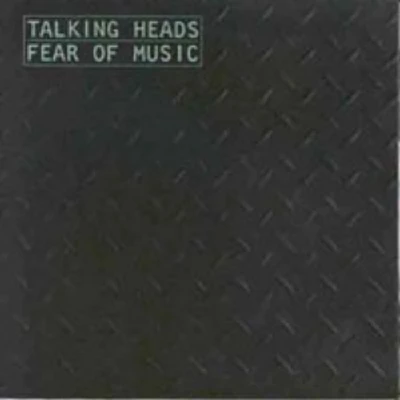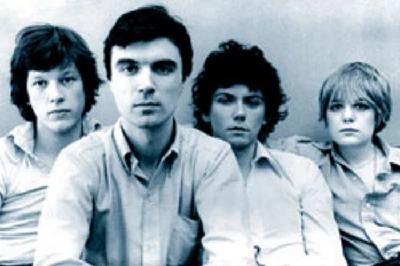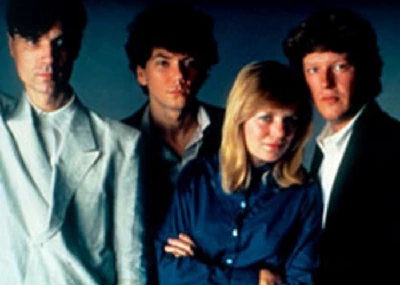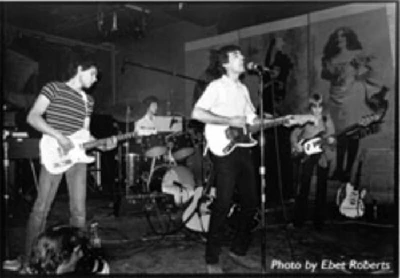published: 20 /
8 /
2005

In his first article for us new Pennyblackmusic writer Jamie Rowland examines the still seminal impact 26 years on of Talking Heads' classic 1979 album 'Fear of Music'
Article
Over the last couple of years, the pop charts have seen something of an art-rock renaissance, with bands like Franz Ferdinand and The Killers getting both high album and singles sales. But while these bands may well have produced some catchy tunes and well sculpted fringes, their appealing quirkiness and danceable tunes would be non-existent if it were not for Talking Heads’ 'Fear of Music'.
Talking Heads have always appealed to me for their willingness to be different. In the 1970's, David Byrne, Tina Weymouth, Jerry Harrison and Chris Frantz came out of the CBGB’s punk scene with a stop-start, jangling new wave sound that wasn’t quite like anything else. Mixed with this were seemingly random lyrics and Byrne’s sporadic vocals, all of which contributed to giving the band a large fan base in the New York art scene.
But while their first two albums, 'Talking Heads '77' (1977) and 'More Songs About Building and Food' (1978), included gems like ‘Psycho Killer’ and their masterful cover of ‘Take Me to the River’, for me the definitive Talking Heads sound can only be found on their third record, 'Fear of Music', which was released in 1979.
Listening to this album is like listening to ‘The History of Contemporary Music on Tape’; each song seems to have its own legacy of bands taking influence from it. If you were to play ‘Cities’ to a young music fan today, they could easily mistake it for the new Franz Ferdinand single, and ‘Animals’ wouldn’t look at all out of place alongside Modest Mouse tunes like ‘3rd Planet’.
The real appeal of this album, however, is in the sheer volume of creativity to be found on it. From the opening track, ‘I Zimbra’, an African-style rhythm accompanying nonsense lyrics by poet Hugo Ball, the experimental attitude of this band becomes apparent. For example, ‘Memories Can’t Wait’ is a slow, psychedelic dirge, with echoing vocals and a kind of electronic screaming accompanying the chorus. That is, until the song’s finale, where the screaming stops and, from the discordant noise of the chorus, a catchy melody emerges. If the majority of ‘Memories Can’t Wait’ sounds like a bad dream (don’t get me wrong, I mean this in a good way), then the last minute is like waking up with the sun shining.
My two personal favourites on 'Fear of Music' are positioned next to each other in the track listing. The first, ‘Air’, seems at first to be going along a similar route to earlier tracks ‘Mind’ and ‘Paper’, with disjointed lyrics and strangely tuned guitars, but then kicks in with a chorus that’ll tunnel into your brain with a pneumatic drill, then cement itself in place. Yes, it’s very catchy.
Following this is ‘Heaven’, a beautifully laid back pop song with hints of REM and the 60's soul that so influenced Talking Heads. Only this band could make "…a place where nothing ever happens" sound so appealing.
The album 's closer, ‘Drugs’, should be given a mention if only for the different styles and bands you can recognise in it, sounding as it does like a freakish dub/space rock hybrid with a bit of Arab on Radar guitar thrown into the last minute for good measure. And you know what? It sounds great.
Even at 26 years old, 'Fear of Music' sounds fresh as ever, easily standing up to today’s most popular bands, and often bettering them. These days, the word "seminal" is often misused to mean "the hottest new thing", but in the case of Talking Heads, it’s entirely accurate: significant, shaping, influential. Who needs Franz Ferdinand?
Track Listing:-
Picture Gallery:-


